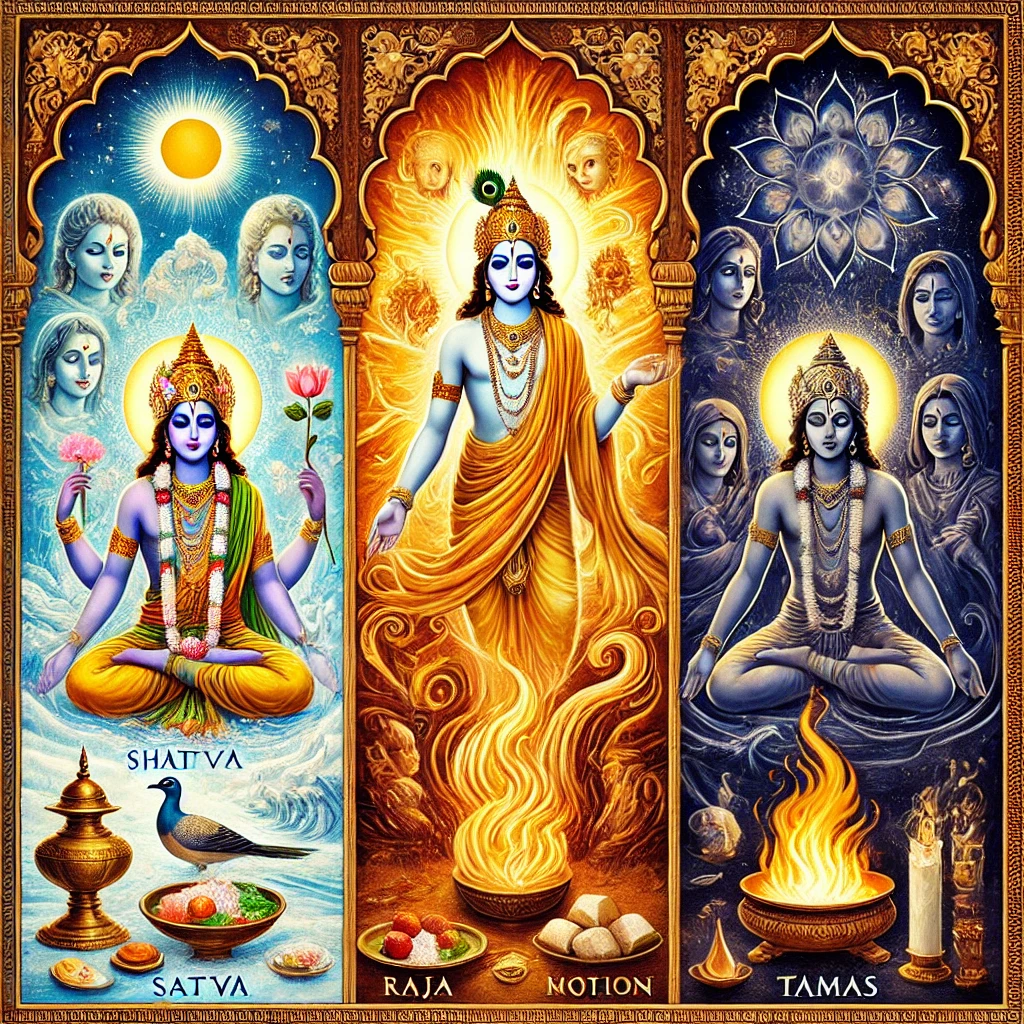

— Shraddhatraya Vibhaga Yoga: The Yoga of the Threefold Division of Faith
Chapter 17 of the Bhagavad Gita, Shraddhatraya Vibhaga Yoga, is a reflective chapter that answers a deeply personal question:
Why do different people live, believe, and worship in different ways?
Arjuna asks what happens when people act with faith but without following scriptural guidance. Krishna replies that the quality of one’s faith (shraddha)—like everything else—is influenced by the three gunas (sattva, rajas, tamas). The kind of food we eat, the vows we take, the words we speak, and the gods we worship—all reflect the nature of our inner tendencies.
This chapter is an invitation to examine our motivations and refine them—to ensure that our faith uplifts rather than binds.
Let’s explore five key life lessons from Chapter 17 and how they apply in modern living.
1. Faith Is Not One-Size-Fits-All—It Reflects Your Inner Nature
Krishna explains that every person’s faith is shaped by their dominant guna.
Verse 3: “The faith of each is according to their nature, O Arjuna. A person is what their faith is.”
Lesson: Your outer actions mirror your inner state. If your spiritual practices feel hollow or forced, ask: What is driving me—love, fear, or ego? Real faith isn’t about ritual alone—it’s about connection, humility, and sincerity.
2. Even the Food You Eat Shapes Your Mind and Energy
Krishna classifies food into three categories:
Verse 7–10: “Foods that increase life, vitality, strength, and joy are sattvic. Foods that cause pain and disease are rajasic. Impure, decaying food is tamasic.”
Lesson: You don’t need to be obsessive, but be mindful of how food affects your energy. Choose what nourishes not just your body, but your mood and clarity. Eat with gratitude and awareness—it’s a spiritual act in itself.
3. Sacrifice (Yajna) Is Noble Only When Done Without Ego
Sacrifice, or yajna, means any action done for a higher purpose. Krishna says sattvic sacrifice is done without desire for reward, with devotion and a sense of duty.
Verse 11: “That sacrifice which is performed as per scriptural direction, without seeking reward, and with a pure heart, is sattvic.”
Lesson: Whether you’re helping someone, making an offering, or doing service—ask yourself: Is this from love or for validation? Real giving is quiet, humble, and selfless. The more ego-free your actions are, the more powerful they become.
4. Your Words Are a Form of Worship—Use Them Kindly
Krishna introduces the concept of Tapas of speech:
Verse 15: “Words that do not cause distress, that are truthful, pleasant, and beneficial—this is tapas of speech.”
Lesson: Speech is sacred. Every word carries power. Before speaking, ask: Is it true? Is it necessary? Is it kind?
Practicing verbal discipline is a form of inner strength—and it builds trust and peace.
5. Even the Simplest Acts Gain Power When Offered to the Divine
Krishna encourages Arjuna (and all of us) to dedicate even the smallest acts—chanting, giving, austerity—to the Divine, done with love and without attachment.
Verse 26–27: “‘OM TAT SAT’—these three represent the Supreme Reality. Actions for the Divine are begun with these sounds by seekers of liberation.”
Lesson: Your spiritual practice doesn’t have to be complex. Whether it’s lighting a lamp, helping someone, or chanting—do it with love and intention, and it becomes sacred. It’s not about what you do—it’s about how and why you do it.
Final Thoughts
Chapter 17 of the Bhagavad Gita is a reminder that faith is personal, powerful, and shaped by your consciousness. It’s not about labels or appearances—it’s about the spirit behind the action. Everything in life—eating, speaking, working, or worshiping—can uplift or bind you, depending on your inner motive.
“Faith practiced with purity, without attachment, and aligned with truth—leads to liberation.” – Gita 17:25“
So the invitation is:
In doing so, everyday life becomes a spiritual path.







